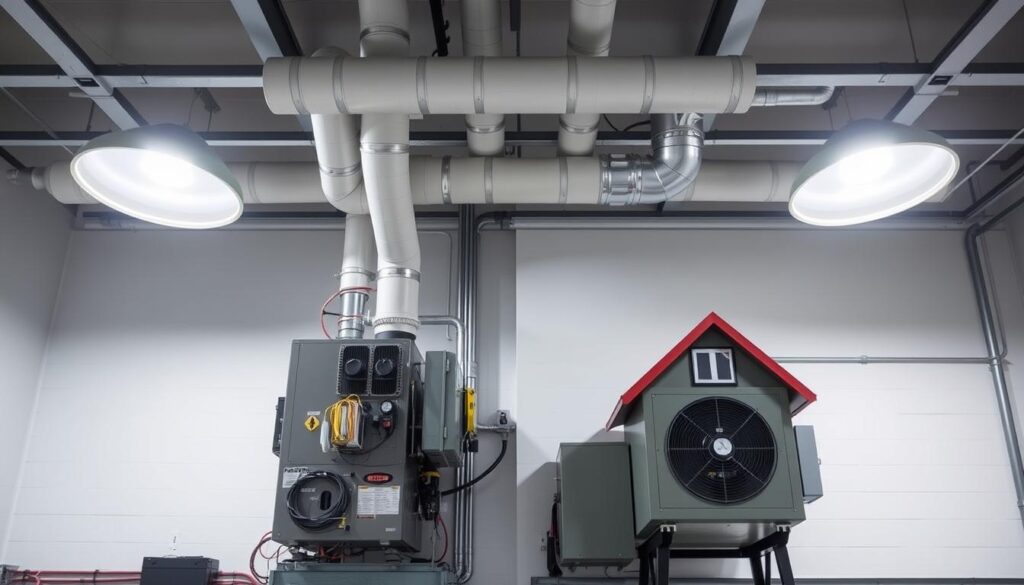Affiliate Disclosure
HVAC Guide Guys is a participant in the Amazon Services LLC Associates Program, an affiliate advertising program designed to provide a means for sites to earn advertising fees by advertising and linking to Amazon.
How Much HVAC Workers Make? Ever thought about a career in heating, ventilation, and air conditioning? It might just lead to financial stability. The HVAC world is changing fast, with more people needing climate control. This means skilled workers are in high demand across the U.S.

The HVAC industry is full of exciting career paths with different pay levels. When you look into HVAC salaries, you’ll see a wide range. This range depends on your experience, where you work, and your specialty. Whether you’re starting out or moving up, there’s good money to be made in this field.
In 2024, HVAC technicians make an average of $49,500 a year. But, salaries can go from $21,500 to $96,000. This shows how important and varied this job can be. Your pay depends on how much you know and how in demand you are.
Key Takeaways
- HVAC technicians earn an average of $49,500 per year
- Salary ranges from $21,500 to $96,000 depending on factors
- Experience and specialization significantly impact earnings
- Growing industry offers strong career advancement opportunities
- Geographic location plays a critical role in compensation
Table of Contents
Understanding HVAC Technician Salaries
The HVAC industry offers good pay for skilled workers. Your salary can change based on experience, location, and specialty. In 2024, knowing the salary range is key for those in or thinking about this field.
HVAC service pay is complex. Technicians get more than just hourly wages.
Base Salary Fundamentals
Your earnings start with a base salary. Technicians make between $45,000 and $75,000 a year. This depends on skill and demand.
- Entry-level jobs start around $35,000
- More experienced technicians can make up to $85,000
- Certifications can increase your earnings
Additional Compensation Opportunities
There’s more to your pay than just a base salary. HVAC pros often have extra income sources:
- Overtime pay: Important during busy times
- Performance bonuses
- Commission for sales work
- Benefits like health insurance
Industry Compensation Benchmarks
Knowing industry standards helps in salary talks. The average HVAC tech makes about $23.80 an hour. This is around $3,146 monthly before taxes.
Continuing to learn and grow can really boost your earnings in HVAC.
National Average Salary Trends for HVAC Workers
Understanding hvac repair wages is key to navigating the HVAC job market. Recent data shows interesting insights into HVAC professionals’ earnings across the United States.
In 2024, HVAC technicians see big salary differences based on many factors. The national hvac earnings landscape shows a wide range of pay:
- Entry-level technicians start around $31,000 per year
- The median salary is near $48,730
- Experienced pros can make up to $80,000 annually
Your salary path depends on several important things:
- Where you work
- How long you’ve been working
- Your specialized skills
- Industry certifications
Technological progress and the need for more energy efficiency are boosting HVAC pay. Those who keep learning and improving their skills can increase their earnings and career chances.
The HVAC industry offers strong opportunities for skilled technicians who are ready to grow and adapt.
Explore Our HVAC Shop
Looking for top-rated HVAC tools, parts, and accessories? Visit our shop and find the perfect solution for your needs.
Visit the ShopHow Much HVAC Workers Make: A Complete Guide
Understanding how much HVAC workers make can help you plan your career. The HVAC industry offers good financial opportunities at different experience levels. Salaries vary based on skills, expertise, and career growth.
Your earnings in the HVAC field can increase with experience and specialized skills. Let’s look at salary ranges at different career stages:
Entry-Level Positions
Starting in HVAC, you can expect good entry-level pay. New technicians usually earn:
- Average hourly rate: $22
- Annual salary range: $40,000 – $48,000
- Basic installation and maintenance tasks
“Your first years in HVAC are key for building foundational skills and understanding the industry.” – HVAC Career Experts
Mid-Career Earnings
With 3-5 years of experience, your pay increases. Mid-career technicians usually make:
- Average hourly rate: $25-$27
- Annual salary range: $52,000 – $56,000
- More complex system installations
- Advanced troubleshooting responsibilities
Senior-Level Compensation
Experienced HVAC pros with 6-9 years earn more. Senior technicians typically earn:
- Average hourly rate: $27-$30
- Annual salary range: $57,000 – $62,000
- Leadership roles in technical teams
- Specialized system design expertise
Your earnings grow with continuous learning, certifications, and specialization in HVAC.
Top-Paying States for HVAC Technicians
Some states pay HVAC technicians more than others. Your salary can change a lot based on where you work in the U.S.
California, Nevada, and New York are the best places for HVAC jobs. They offer the highest salaries to skilled workers.
- California: Leads with highest average salaries due to complex climate needs
- Nevada: Strong demand in urban centers like Las Vegas drives competitive wages
- New York: Robust construction and maintenance markets support high compensation
Other states with great salaries for HVAC jobs include:
- Alaska: Extreme climate conditions require specialized HVAC expertise
- Massachusetts: Technology-driven markets demand sophisticated HVAC skills
- Connecticut: High cost of living translates to higher technician wages
Your salary can be affected by local economy, population, and infrastructure. Cities usually pay more than rural areas.
Strategic career planning involves understanding regional salary variations and market demands.
Looking into salary trends by state can guide your HVAC career. It can also help you decide if moving is a good idea.
Explore Our HVAC Shop
Looking for top-rated HVAC tools, parts, and accessories? Visit our shop and find the perfect solution for your needs.
Visit the ShopExperience Levels and Salary Progression
Your HVAC career is a journey of growth and increasing earnings. As you gain experience, your salary will grow. Knowing how experience affects your pay can help you plan your career.
Going from apprentice to master technician is a big financial step. Each stage brings new skills, responsibilities, and pay.
Apprentice to Journeyman Transition
Apprentices earn 30-50% of a journeyman’s pay. This phase includes lots of on-the-job training and classroom learning.
- Apprentice hourly rate: $15-$22
- Training duration: 3-5 years
- Required classroom hours: 144 annually
- On-the-job training: 2,000 hours per year
Master Technician Earnings
Master technicians are at the top of their game. They have advanced certifications and lots of experience, leading to higher pay.
| Experience Level | Average Annual Salary | Hourly Rate |
|---|---|---|
| Entry-Level | $35,000 | $17-$22 |
| Journeyman | $55,000-$65,000 | $25-$32 |
| Master Technician | $75,000-$90,000 | $35-$45 |
Management Role Compensation
Getting into management can really boost your pay. HVAC service managers and directors can make $80,000 to $120,000 a year. This depends on the company size and location.
“Continuous learning and skill development are the keys to salary progression in the HVAC industry.” – HVAC Industry Expert
Your pay goes up with each new skill and year of experience. Invest in your growth to reach the top of your HVAC career.
Commercial vs Residential HVAC Pay Differences

Exploring hvac installer income shows big pay differences between commercial and residential work. The size and complexity of systems affect how much you earn.
Commercial HVAC techs make more because their job is more complex. They work on big places like office buildings and hospitals. These need advanced systems and skills.
- Commercial HVAC projects demand advanced technical knowledge
- Residential work focuses on smaller, more straightforward systems
- Complexity directly impacts hvac service pay rates
The salary gap comes from several factors:
| Work Type | Average Annual Income | Skill Requirements |
|---|---|---|
| Commercial HVAC | $65,000 – $85,000 | Advanced technical expertise |
| Residential HVAC | $45,000 – $65,000 | Standard technical skills |
Choosing commercial HVAC can lead to higher earnings. You’ll need advanced certifications and a deep understanding of complex systems. Residential work has steadier hours but pays less.
Invest in specialized training to maximize your earning in the HVAC industry.
Explore Our HVAC Shop
Looking for top-rated HVAC tools, parts, and accessories? Visit our shop and find the perfect solution for your needs.
Visit the ShopCertification Impact on HVAC Salaries
Certifications can greatly increase your hvac repair wages. They show you’re an expert and committed, making you more attractive to employers.
Getting the right certifications changes your career path. They prove your skills and can lead to better-paying jobs.
EPA Certification Benefits
The Environmental Protection Agency (EPA) 608 Certification is key for HVAC techs. It shows you can work with refrigerants safely and well.
- Required for all refrigerant work
- Demonstrates technical competence
- Potential salary increase of 5-10%
NATE Certification Value
North American Technician Excellence (NATE) certifications are top-notch in HVAC. They highlight your advanced knowledge in specific areas.
- Covers multiple specialization areas
- Recognized by top industry employers
- Can increase earning by 15-20%
Specialized Training Returns
Investing in specific training boosts your appeal. Specialized certifications in areas like solar thermal systems or commercial refrigeration make you stand out.
Employers look for techs who keep learning. Advanced certifications show your dedication to growth. This can lead to higher wages and more interesting jobs.
Geographic Salary Variations
Your HVAC career pay can change a lot based on where you work. The United States has different areas with unique pay for HVAC contractors.
Many factors affect how much HVAC contractors earn. These include the local economy, demand for HVAC services, and living costs. All these play a big part in your salary.
- Southern states like Arkansas, Tennessee, and Mississippi usually have lower salaries
- Northeastern and Western cities often pay more
- Rural areas might offer better rates because there are fewer skilled technicians
Knowing about these differences helps HVAC workers make better choices. Your salary depends on the local market and what the area needs.
| Region | Average Annual Salary | Cost of Living Index |
|---|---|---|
| Northeast | $65,000 | 120 |
| Southwest | $55,000 | 90 |
| Midwest | $52,000 | 85 |
| West Coast | $70,000 | 135 |
Planning your career means looking at more than just salary. It’s about finding a balance between what you earn and what it costs to live. This ensures you’re happy with your HVAC career in the long run.
Industry Demand and Growth Projections

The HVAC industry is booming, opening up great opportunities for those in the field. The U.S. Bureau of Labor Statistics says HVAC technician jobs will grow by 9% from 2023 to 2033. This is much faster than the average job growth rate.
Several factors are driving this growth in HVAC jobs:
- More focus on energy-efficient building technologies
- Growing awareness of environmental issues
- Fast advancements in HVAC systems
- Old buildings needing new heating and cooling systems
The rise of green building is changing the HVAC world. Sustainable design and energy-efficient systems are now key for homes and businesses. This shift is creating new roles for skilled technicians.
New specializations are changing HVAC careers. Smart home tech, renewable energy, and advanced climate control are creating new paths for those who keep learning.
The future of HVAC is not just about maintaining temperature – it’s about creating intelligent, sustainable environments.
Your career growth in HVAC is huge. By keeping up with new tech and getting specialized training, you can lead in this growing field.
Factors Affecting HVAC Worker Compensation
Figuring out how much HVAC workers make involves looking at many complex factors. These factors shape the salary of HVAC technicians. Your salary in this field depends on several key elements that can greatly affect your career path.
The HVAC industry’s pay is shaped by many factors that workers need to understand well.
Economic Influences
Economic conditions are a big deal in figuring out HVAC worker salaries. Important economic factors include:
- Regional economic stability
- Construction industry growth
- Housing market trends
- Energy pricing fluctuations
Market Competition
Your salary as an HVAC technician can be affected by market competition. Places with high demand and few skilled workers usually pay more.
| Market Factor | Salary Impact |
|---|---|
| High Local Demand | Increased Wages |
| Low Competition | Higher Earning |
| Specialized Skills | Premium Compensation |
Skill Requirements
Technological changes keep changing what skills are needed in HVAC. Technicians who keep learning and get special certifications can earn more.
- Advanced technical training
- Green technology expertise
- Smart home system integration
- Energy efficiency certifications
Staying ahead of industry trends is key to maximizing your earning as an HVAC professional.
Explore Our HVAC Shop
Looking for top-rated HVAC tools, parts, and accessories? Visit our shop and find the perfect solution for your needs.
Visit the ShopCareer Advancement Opportunities
The HVAC industry is full of chances for career growth and higher earnings. You can move beyond just being a technician. With the right planning and skills, you can climb the career ladder.
There are several ways to advance in HVAC:
- Specialized Technician Roles
- Management Positions
- Business Ownership
- Technical Training and Education
Getting specialized can really increase your earnings. Experts in complex systems like commercial refrigeration earn more. Getting certified by NATE can also lead to better pay.
“Your skills are your most valuable asset in the HVAC industry” – Professional HVAC Association
For those who want to be their own boss, starting an HVAC business is a great option. It lets you earn as much as you want and control your career. Business owners can make a lot more than regular employees.
To move up in your HVAC career, follow these steps:
- Keep learning and getting educated
- Get advanced certifications
- Build a strong network
- Focus on excellent customer service
By focusing on your career growth, you can turn your HVAC job into a rewarding and profitable career.
Conclusion
The HVAC industry offers strong career paths for those looking for stable and well-paying jobs. Your earnings can change a lot based on your experience, what you specialize in, and where you work. With the right skills and career moves, you could make over $100,000 a year.
To understand how much you can earn, you need a good plan. Getting advanced certifications and training can really boost your income. Also, focusing on areas with high demand can help a lot. The best HVAC pros keep learning and adapting to new trends.
The future of HVAC jobs looks bright, with more demand for skilled workers. Your earnings will grow as you improve your skills and offer top-notch service. With the right strategy, your technical abilities can lead to a fulfilling and secure career.
As the HVAC field keeps changing, those who stay updated and focus on quality will find many chances for growth. Your hard work and skill development will drive your success in the long run.
